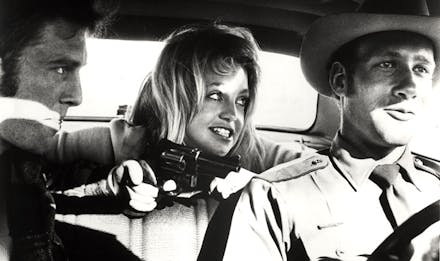The Sugarland Express has never sat very comfortably in the Spielberg cannon. It's always gratifying to go back to the source of a great career and to pinpoint the seeds of promise from which that greatness grew. The problem with Spielberg though, is knowing where to start. It's easy, for instance, to argue that The Sugarland Express was not his first feature. 1972's Duel, although made for TV was released theatrically in Europe.
There is also a certain reluctance to accept Sugarland as the beginning of anything. Duel, in many respects, is a vastly superior film and makes for a far more arresting curtain-raiser to Spielberg's big screen career. The seeds of greatness are obvious in Duel; they are not nearly so prominent in Sugarland.
It's a cop out, of course. The Sugarland Express marked Spielberg's de facto debut as a feature film director, and should be treated accordingly. Because he sprang himself from it so quickly (destroying it in the process, some would argue) it's strange to think that in 1974 Spielberg, 28 at the time, was considered a leading light of the American New Wave. Or, at least, the tail end of what certain critics, with rapidly waning conviction, were touting as such. Sugarland was widely regarded as the aesthetic bedfellow of Scorsese's Mean Streets, George Lucas's American Grafitti, Robert Altman's Thieves Like Us and Terence Malick's Badlands, all of which were released during the same 12 month period. It was well-received critically and undoubtedly smoothed Spielberg's transition from workaday TV director to fully-fledged filmmaker. Even so, few people (save Pauline Kael) saw in it anything more than a glimmer of the phenomenal talent at work beneath its grainy, downbeat surface. Many commentators made the inevitable comparisons with Malick's Badlands — the theme of fugitive lovers is common to both — concluding that Spielberg's film was far less promising.
It's difficult to disagree. Based on a true story, Sugarland chronicles the exploits of a Springer-fodder, white trash Texas couple and their desperate attempt to wrestle their child from the clutches of social services. The film begins with Lou Jean Poplin (Hawn) bullying her docile husband Clovis (Atherton) into busting out of jail and joining her on a quest to kidnap the youngster from its foster parents. In the process they take Highway Patrolman Maxwell Slide (Sacks) hostage by mistake, and are pursued across the Texas plains by a train of patrol cars. A media frenzy erupts and the duo become minor folk heroes, cheered on by masses of well-wishers at the roadside.
It's a thoroughly competent film, the action is well choreographed and fine performances abound, notably from Hawn and Michael Sacks as the hapless prisoner who forms a bond of trust and friendship with his captors. But it's also a frustrating one in that it tells us almost nothing about where, artistically speaking, Spielberg was at the time. It's such a confoundedly timorous affair. Getting the audience rooting for the bad guys leans heavily on Bonnie And Clyde (1967) and the revved up road movie format is a nod to both
Easy Rider and Badlands — all highly credible reference points. Unfortunately, Sugarland bottles it. Lou Jean and Clovis aren't bad people, they're the victims of circumstance. Their crimes are committed in the course of a noble quest, their actions fuelled by the purest of motives. The cops run out of patience, but they're decent human beings. Johnson's avuncular chief of police comes across as particularly implausible, this is Texas after all.
It's as if Spielberg was being pulled in two directions at once: towards the rebel poetry of Altman, Scorsese and Malick on the one hand, and the allure of popular approval on the other. He never seems entirely comfortable with the material. And if it was a conflict of art versus commerce (or, perhaps more accurately, alt versus pop) then the film's commercial failure surely influenced his decision to opt emphatically for the latter in future endeavours.
There are certainly flashes of brilliance in Sugarland, most notably in Vilmos Zsigmond's dour cinematography. And, as with all Spielberg's movies, certain visual set-pieces linger in the memory. But for all that, it remains a steadfastly ordinary moment of transition: a skilful film, not an inspired one. The moral canvas is a pastel-hued blur — and whatever stance Spielberg has taken in the years since, you could never accuse him of ambiguity in that department. The shifts in tone, too (a pre-requisite of any New Wave contender), are present and correct, but too often the lurches from comedy to drama, pathos to violence are jarring, and the final descent into tragedy is gratuitously harsh. Again, compared to the queasy menace that courses through Badlands it's maudlin and contrived.
Sugarland is, ultimately, both interesting for what it isn't — a celluloid petri dish teeming with protean Spielbergisms — and for what it is — an unremarkable instance of a gifted director searching cautiously for his own voice. What is remarkable is that he found it barely a year later; unleashing a deafening roar with Jaws.
